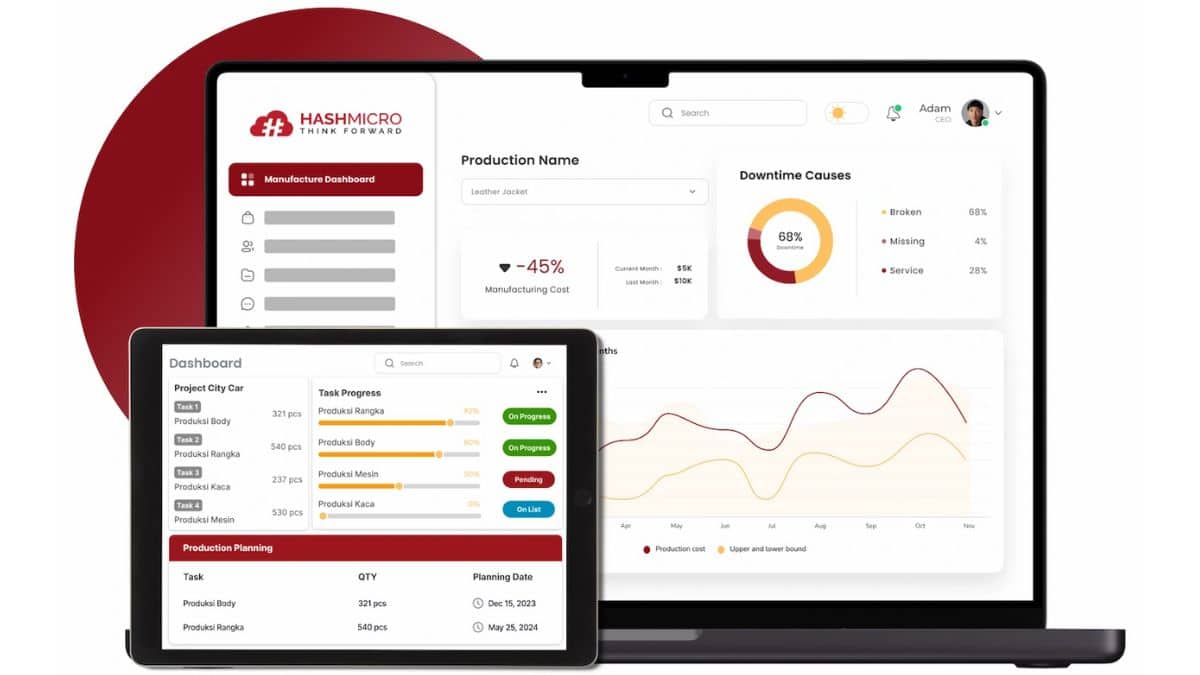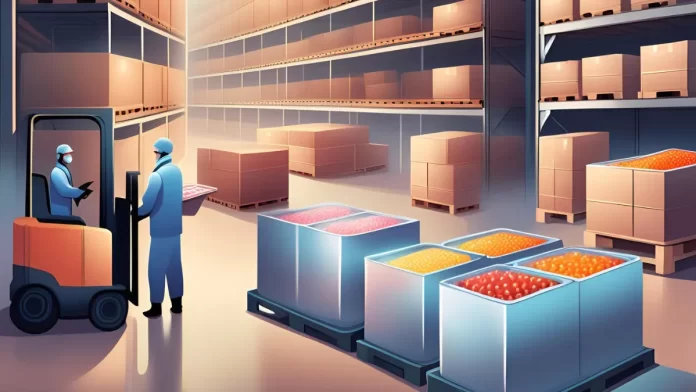In today’s fast-paced industries, managing temperature-sensitive products is challenging, especially in food, beverage, pharmaceutical, and chemical sectors. Utilizing cold storage warehouse ensures these products maintain quality from production to distribution, comply with safety standards, and prevent spoilage.
The global cold storage market was valued at USD 46.12 billion in 2024. According to a report by Straits Research, it is projected to reach USD 106.70 billion by 2033, growing at a CAGR of 9.8%. This significant growth highlights the increasing reliance on refrigerated warehouse logistics to preserve product integrity and extend shelf life
Without proper temperature management, perishable goods can deteriorate, leading to financial losses and regulatory risks. A cold storage warehouse provides a controlled environment that preserves product integrity. It ensures compliance with food and safety regulations while enhancing supply chain efficiency.
This article explores the definition and key components of a cold storage warehouse. It also discusses its role in different industries and how businesses can optimize storage operations with the right technology.
Key Takeaways
|
Table of Content
Content Lists

What is a Cold Storage Warehouse?
A cold storage warehouse is a temperature-controlled facility designed to store perishable goods such as food, pharmaceuticals, chemicals, and other temperature-sensitive products. These warehouses help maintain optimal conditions by regulating temperature and humidity, ensuring that products remain fresh, safe, and free from contamination throughout the supply chain.
Cold storage facilities play a crucial role in preserving product integrity, preventing spoilage, and extending shelf life. They are essential for industries that require strict temperature control to comply with health and safety regulations, such as food and beverage, healthcare, and logistics. Without proper cold storage, perishable goods can deteriorate, become unsafe for consumption, and lead to financial losses for businesses.
Modern cold storage warehouses are equipped with advanced refrigeration systems, real-time monitoring, and automated inventory management to ensure that products are stored under ideal conditions. These facilities can range from small-scale refrigerated rooms to large industrial warehouses that handle bulk storage and distribution for national and international markets.
How Does a Cold Storage Warehouse Work?
Cold storage warehouses operate using advanced refrigeration systems that regulate temperatures based on product requirements. Here’s how they function:
- Temperature Control Systems: Automated cooling systems maintain precise temperatures, preventing fluctuations that could damage products.
- Insulated Storage Areas: Walls, floors, and doors are built with high-quality insulation to prevent heat transfer and maintain consistent cold conditions.
- Real-Time Monitoring: Sensors and automated tracking systems continuously monitor and adjust temperature settings to ensure optimal storage conditions.
- Efficient Inventory Management: Cold storage facilities use automated inventory tracking to optimize space usage and minimize exposure to temperature changes during loading and unloading.
- Backup Power & Emergency Systems: Generators and fail-safe mechanisms prevent temperature fluctuations in case of power failures.
By controlling temperature and humidity, cold storage warehouses protect products from contamination, maintain quality, and prevent financial losses due to spoilage.
Key Components of a Cold Storage Warehouse
A cold storage warehouse relies on several critical components to maintain optimal temperature, ensure product safety, and enhance efficiency.
- Cooling and Refrigeration Systems: The core of any cold storage warehouse is its refrigeration system, which regulates temperature based on product requirements. Many warehouses use blast freezers, condensers, and evaporators to ensure stable cooling. Some advanced facilities adopt CO₂ and ammonia-based refrigeration systems for better energy efficiency and environmental sustainability.
- Thermal Insulation: Proper insulation is essential to prevent temperature fluctuations and reduce energy loss. Cold storage facilities use insulated walls, floors, and ceilings to maintain a stable internal environment. High-quality insulation helps warehouses minimize cooling costs while ensuring that external temperatures do not affect stored products.
- Temperature and Humidity Control: Automated temperature and humidity control systems help maintain precise storage conditions for different types of perishable goods. These systems adjust cooling levels in real time to prevent overheating or freezing. Humidity regulation is also crucial to prevent condensation and ice buildup, which can degrade packaging and affect product quality.
- Security and Monitoring: To maintain product safety, modern cold storage warehouses are equipped with IoT-powered sensors and AI-driven monitoring systems. These systems continuously track temperature levels and send alerts in case of fluctuations. Additional security measures, such as CCTV surveillance, access control systems, and automated alarms, ensure that only authorized personnel handle temperature-sensitive products.
- Storage Racks and Layout: Efficient storage design is key to optimizing space and maintaining proper airflow. Many warehouses use warehouse storage system solutions, such as pallet racking, to maximize capacity and organize products based on temperature needs. Storage zones are divided into chilled, frozen, and deep-freeze sections, ensuring that each product type remains in its ideal condition.
By integrating these essential components, cold storage warehouses help businesses preserve product integrity, meet regulatory standards, and improve operational efficiency.
Types of Cold Storage Warehouses
Different industries require various types of cold storage warehouses to store products at the appropriate temperature. Each type is designed to cater to specific storage and transportation needs while maintaining product quality.
Cold Storage Containers
Portable refrigerated units play a crucial role in transporting temperature-sensitive goods over long distances. Designed with built-in cooling systems, these units actively maintain a stable temperature, ensuring that products remain fresh and safe throughout the journey. They are widely used for shipping frozen food, pharmaceuticals, and chemicals, making them essential for both international and domestic logistics.
Chillers
Chillers are designed to keep products at moderately low temperatures without freezing them. Commonly used in food and beverage, pharmaceuticals, and laboratories, chillers help maintain freshness and prevent bacterial growth while keeping products at an optimal temperature range.
Frozen Storage Warehouses
These facilities maintain sub-zero temperatures, typically below -18°C, to store products that need to remain frozen, such as meat, seafood, frozen vegetables, and ice cream. This type of storage ensures long-term preservation and prevents spoilage by stopping microbial activity.
Walk-in Chillers and Freezers
Walk-in chillers are smaller cold storage solutions commonly used by restaurants, supermarkets, and convenience stores to store fresh and frozen food. They offer easy access to frequently used perishable goods, making them ideal for businesses that require quick product retrieval.
By choosing the right cold storage warehouse type, businesses can extend product shelf life, reduce waste, and ensure regulatory compliance across various industries.
Industries That Rely on Cold Storage Warehouses

Cold storage warehouses play a crucial role in various industries that require strict temperature control to maintain product quality and safety. Here are some of the key sectors that depend on refrigerated warehouse logistics for their operations.
- Food and Beverage Industry: The food industry is one of the largest users of cold storage warehouses. Perishable items such as meat, seafood, dairy, frozen food, and fresh produce require precise temperature regulation to prevent spoilage. Proper cold storage ensures that food products retain their nutritional value, taste, and safety before reaching consumers.
- Pharmaceutical and Healthcare Industry: Vaccines, medicines, and biologics require controlled storage conditions to maintain potency and effectiveness. Cold storage warehouses help pharmaceutical companies, hospitals, and research laboratories store sensitive products at stable temperatures. This ensures compliance with health and safety regulations.
- Chemical and Biotechnology Industry: Certain chemicals, reagents, and laboratory samples need temperature-controlled environments to prevent degradation. Cold storage ensures that these substances remain stable, safe, and ready for use, particularly in biotechnology and research applications.
- Logistics and E-commerce: With the rise of online grocery shopping and direct-to-consumer delivery services, third-party logistics (3PL) providers and e-commerce companies increasingly rely on cold storage warehouses. These facilities help store and distribute perishable goods efficiently while maintaining quality during transportation.
By utilizing cold storage warehouses, businesses across these industries can reduce product waste, comply with regulations, and meet growing consumer demands for high-quality temperature-sensitive goods.
The Role of Automation in Cold Storage Warehouses
Automation is transforming cold storage warehouse management, making operations more efficient, accurate, and cost-effective. By integrating smart technology, businesses can maintain precise temperature control, improve inventory accuracy, and reduce energy consumption.
- Automated Temperature Control: Modern cold storage warehouses use IoT-powered sensors and AI-driven monitoring systems to track and regulate temperature and humidity in real time. These systems automatically adjust cooling levels to prevent fluctuations, ensuring optimal storage conditions for perishable goods.
- Real-Time Inventory Tracking: Automated warehouse management system (WMS) help track stock levels, expiry dates, and product movements within the warehouse. With barcode scanning and RFID technology, businesses can reduce human error, optimize storage space, and ensure faster order fulfillment.
- Energy-Efficient Cooling Systems: Smart cooling solutions use predictive analytics to minimize energy waste by adjusting refrigeration levels based on demand. These systems help businesses reduce operational costs while also promoting sustainability.
- Automated Security and Alerts: Advanced security systems include CCTV monitoring, access controls, and alarm notifications for temperature deviations, unauthorized entry, or equipment failures. This helps prevent spoilage, theft, and compliance risks.
By implementing automated solutions, cold storage warehouses can enhance efficiency and improve product safety. This also helps optimize energy usage, making them vital to modern supply chains.
Optimizing Cold Storage Warehouse Management with HashMicro WMS

Managing a cold storage warehouse requires precision, efficiency, and automation to ensure that temperature-sensitive products remain in optimal condition. HashMicro’s Warehouse Management System (WMS) provides a comprehensive solution for businesses seeking to enhance inventory accuracy and temperature control. Additionally, it helps improve overall operational efficiency.
- Integrated Temperature Monitoring: HashMicro WMS allows businesses to track and regulate warehouse temperatures in real time, reducing the risk of spoilage and ensuring compliance with safety regulations.
- Automated Inventory Management: With barcode and RFID integration, businesses can monitor stock levels, expiration dates, and product movement effortlessly, minimizing errors and optimizing storage space.
- Seamless Order Processing & Distribution: The system automates picking, packing, and shipping processes, ensuring faster and more accurate deliveries, which is crucial for industries like food, pharmaceuticals, and logistics.
- Advanced Reporting & Analytics: HashMicro WMS provides detailed insights into warehouse performance, enabling businesses to make data-driven decisions for better cost efficiency and inventory control.
HashMicro’s WMS helps businesses streamline cold storage, reduce losses, and maintain product integrity for a more reliable, profitable supply chain.
Conclusion
In temperature-sensitive industries, a cold storage warehouse preserves quality, prevents spoilage, and ensures regulatory compliance for essential products. As the global demand for refrigerated warehouse logistics grows, businesses must adopt efficient storage solutions to maintain their competitive edge.
The adoption of automation and smart warehouse management can greatly enhance operational efficiency. HashMicro’s Warehouse Management System (WMS) provides real-time temperature monitoring, automated inventory control, and seamless order processing. These features help businesses optimize their cold storage operations efficiently.
To experience how HashMicro WMS can improve your cold storage warehouse efficiency, try a free demo today and take the next step toward smarter, more secure warehouse management.

FAQ about Cold Storage Warehouse
-
What is a cold storage warehouse?
A cold storage warehouse is a temperature-controlled facility that are use to store perishable goods like food, pharmaceuticals, and chemicals. It helps maintain optimal temperature and humidity to prevent spoilage, extend shelf life, and ensure product safety.
-
What is the concept of cold storage?
Cold storage refers to the process of storing temperature-sensitive products in a controlled environment to preserve freshness, quality, and stability. Industries that handle perishable or sensitive goods widely use this concept.
-
What is cold chain in a warehouse?
The cold chain in a warehouse is a temperature-controlled supply chain system. It ensures products stay at consistent cold temperatures from storage to distribution. It prevents temperature fluctuations that could compromise product integrity.
-
What are the requirements for cold storage facilities?
Cold storage facilities must have efficient refrigeration systems, proper insulation, temperature and humidity controls, security monitoring, and backup power sources. These elements ensure stable storage conditions and regulatory compliance.




































